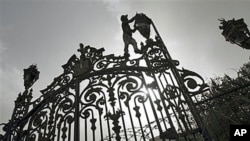One year after defiant Egyptians took to the streets demanding change, the change that came is not what many envisioned on the anniversary of the January 25 revolution.
The millions who poured into Tahrir Square last year came from all walks of life: the poor, the middle class, Muslims and Christians. But the seeds of the uprising were largely planted by the young and the secular. They were the Facebook activists, the Twitter organizers, and they became the face of the revolution.
One year later, it is the Muslim Brotherhood, largely absent from the early days of the revolt, which now dominates the first popularly elected body of the new Egypt, leaving many young activists, like Hanan Abdel Alim, unhappy.
"I think this council came on the blood of the people who died in the [Tahrir] Square and we're here to remind them that it was a revolution that brought them this council," said Alim.
Pro-democracy, Islamist views
For pro-democracy activists, their fight has been bittersweet: They called for the voice of the people to be heard, and are now hearing that people want Islamists.
Not everyone despairs. Some, like Sameh Abdel Azim, are optimistic that this will be an unbiased parliament, able to stand up to other powers, including the current military rulers.
"These people are elected from the Egyptian people and we trust our choice, and we trust that they will follow our hopes, insha'allah. We hope that this new parliament is different from the past and we are in a new environment after the revolution," said Azim.
Other activists dismiss the Islamist ascendency as a distraction. Human rights activist Gasser Razek said the debate about a secular state versus a religious one is "completely artificial."
"Egypt has never been a secular state, Egypt has always been somewhere in the middle: simple things, [for example] inheritance. You do not inherit according to a civilian law. You inherit according to sharia, and you inherit according to rules that the church sets. A Christian man cannot marry a Muslim woman; there is no civil marriage in this country," said Razek.
Working together, with military
What is new, many say, is the need to get along. The country's problems are such that the Muslim Brotherhood has made clear it does not want to shoulder responsibility alone, and Razek argues that is a good thing.
"We all have been living under a very repressive, autocratic regime for almost 60 years. No one has learned over those 60 years to work in coalitions. No one has learned to play the game properly and I think Egypt needs that today. Egypt needs Islamists to work with liberals," said Razek.
The first challenge, some say, is making sure the people's voice remains heard. And for them, that means getting the military back to their barracks.
The military may have taken a step in that direction Tuesday when Egyptian military ruler Mohamed Hussein Tantawi announced that he will partially lift the country's 30-year-long state of emergency, long a staple of Egypt's military rule.
| Join the conversation on our social journalism site - Middle East Voices. Follow our Middle East reports on Twitter and discuss them on our Facebook page. |
















